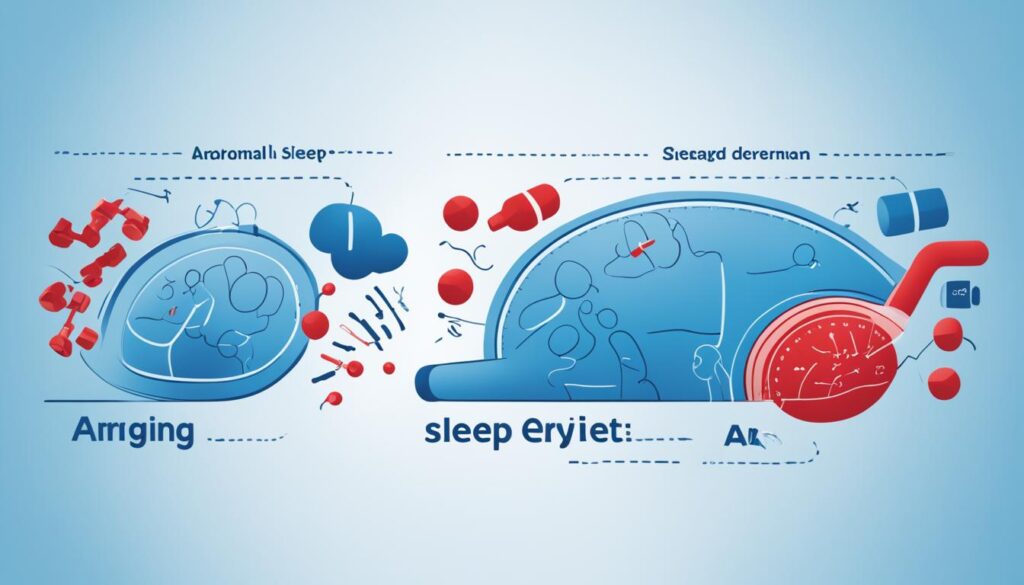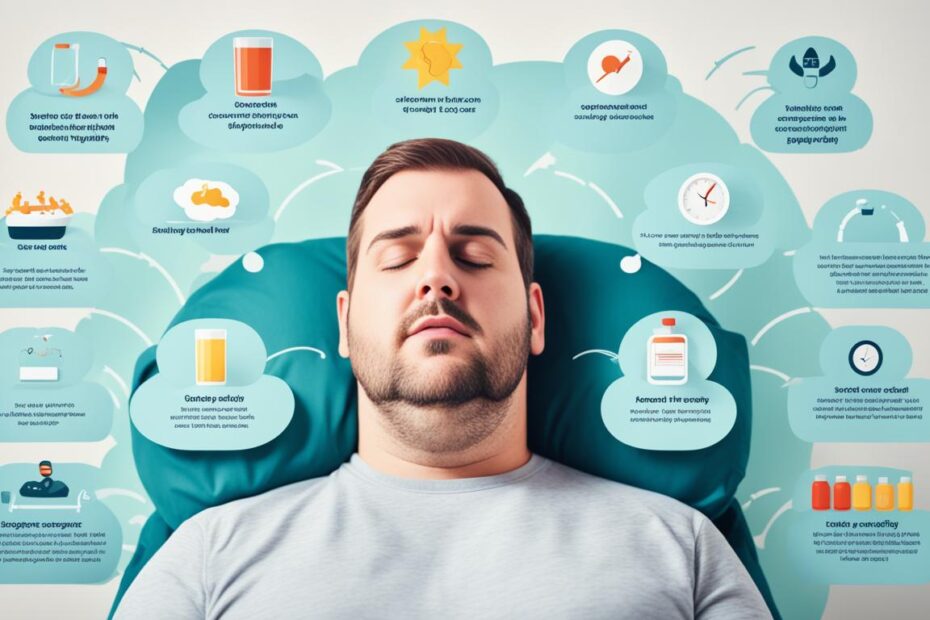I’ve looked into sleep disorders and found a big question. Does losing weight really help with sleep apnea? Millions are affected by this, causing sleep troubles and hurting health. I learned that carrying extra weight makes sleep apnea more likely.
The exciting thing? Dropping just 5-10% of your weight can greatly help sleep apnea. In this guide, I will show how weight and sleep apnea are linked. We’ll talk about good ways to treat it and how to keep it from coming back. Whether you’re big and have sleep problems or just want to learn more, I’ve got you.
Understanding Sleep Apnea and Its Connection to Weight
Sleep apnea and weight are closely linked. Many folks find it tough to manage both. But, knowing how they’re tied helps find good answers. Let’s look into how weight and sleep apnea affect each other and your health.
What is obstructive sleep apnea?
Obstructive sleep apnea happens when your airway gets blocked while you sleep. This causes breathing pauses and disrupts your sleep. Signs include loud snoring, gasping for air, and feeling tired during the day. Ignoring sleep apnea can harm your health and life quality.

How excess weight contributes to sleep apnea
Carrying extra weight is a big factor in sleep apnea. Neck fat can block your airway, which may close up while you sleep. Weight loss is key to dealing with sleep apnea. Gaining even a little weight can up your chances of getting it.
The role of pharyngeal fat in airway obstruction
Pharyngeal fat, in the throat, can also cause sleep apnea. This fat can squash your airway, making night breathing hard. Changing your lifestyle, like diet and exercise, can reduce this fat. Doing so might improve how you breathe and lower sleep apnea signs.
It’s important to see how sleep apnea and weight are related. By working on your weight and making healthy choices, you can better your sleep and health.
The Vicious Cycle: Sleep Apnea and Weight Gain
Sleep apnea and weight gain are hard problems linked together. It’s a tough cycle to stop. When you don’t sleep well, your body can’t work right. This messes up how hungry you feel.
Your body loses the ability to know when it’s full. It also makes you feel more hungry. This can lead to eating too much. Then, you might gain more weight. Sleep apnea and overall health are connected, making this cycle tricky to fix.

Always feeling tired is part of this. If you’re sleepy, you won’t want to move much. You might not feel like exercising or being active. This can make you gain even more weight.
It’s a hard cycle to end, but understanding is the first step. Knowing this, you can look for ways to treat sleep apnea and not gain more weight.
- Poor sleep increases hunger hormones
- Daytime sleepiness reduces physical activity
- Weight gain worsens sleep apnea symptoms
This cycle can be stopped, but it’s hard work. Try to get better sleep and manage your weight. This can make your sleep apnea and health improve.
Health Risks Associated with Sleep Apnea and Obesity
Sleep apnea and obesity are a dangerous match for our health. They create a mix that can lead to serious issues. We need to look at the big problems they make together.
Cardiovascular Complications
Your heart can have trouble when sleep apnea and obesity work together. The blood doesn’t have enough oxygen at night. This can cause swelling and a sickness of the arteries. They raise the risk for things like:
- Hypertension
- Atrial fibrillation
- Heart failure
- Stroke
- Coronary heart disease
This is serious stuff.Finding out if you have sleep early is key.
Metabolic Disorders
Obesity and sleep issues can cause problems with your metabolism. Type 2 diabetes and other issues can show up. It is a hard cycle to stop without help.
Respiratory Issues
Having trouble breathing? You might with sleep apnea and overweight. It can make breathing hard. This can cause more issues for your heart and breath.
It’s really important to take care of sleep apnea and obesity. It’s not just sleep that is important. It’s about keeping your whole body healthy.
Does Losing Weight Help Sleep Apnea?
Weight loss can really help with sleep apnea. Study after study shows this. And it’s not just about looking good. Losing weight can directly improve how you sleep.
Impact of Weight Loss on Sleep Apnea Symptoms
Losing just 5-10% of your body weight can help a lot. This often shows the biggest difference in how you feel. For someone 200 pounds, that means losing 20 pounds can make their sleep apnea symptoms better.
How Weight Loss Improves Airway Function
Weight loss trims more than your waist. It also reduces fat around your neck and throat. This change can make your airway bigger. A bigger airway is easier to breathe through, especially when sleeping. This makes weight loss a top way to tackle sleep apnea.
The Role of Tongue Fat Reduction
Yes, your tongue’s fat matters for sleep apnea. New MRI studies proved that losing weight cuts tongue fat. Less tongue fat means your sleep apnea may get better. It’s amazing how much losing weight can help.
But, losing weight is not everything. Some still need more help. Yet, for many, shedding extra pounds can be a big first step. It leads to better sleep and overall health.
Effective Weight Loss Strategies for Sleep Apnea Patients
Lifestyle changes can help a lot with sleep apnea. Losing weight is crucial for people with obesity and sleep issues. Let’s learn some good ways to lose weight.
Eating 1,200 to 1,500 calories a day works for women. Men should try 1,500 to 1,800 calories. The aim is to lose 1 to 2 pounds weekly. Going slow and steady is best for long-term results.
Choosing whole foods is a wise move. Try to eat at the same times every day. Keep track of what you eat and drink plenty of water. Be careful with high-calorie sauces and dressings.
Sometimes, diet and exercise aren’t enough. Then, a doctor might recommend medicines or surgery. These choices need a lot of thinking and expert advice.
Improving your health takes time. But with a solid plan, better sleep and health are within reach.
Beyond Weight Loss: Other Treatments for Sleep Apnea
Weight loss is good, but we have more ways to tackle sleep apnea. Let’s dive into some great ways to deal with this problem, other than just dropping weight.
CPAP Therapy
CPAP is the best way to treat sleep apnea. It uses a mask and air to keep your airway open at night. I know from reading that CPAP therapy really helps improve how long you live with OSA. It’s key to stick with CPAP, even if you’re working on losing weight.
Oral Appliances
If CPAP is hard for you, you might try oral appliances. These small devices go in your mouth to help keep your breath way open during sleep. They’re often suggested for less serious cases or if you can’t use CPAP well.
Surgical Options
Sometimes, surgery could be a choice. This might include taking out extra throat tissue or changing your jaw’s position. It’s mostly when other treatments haven’t worked out.
Working with a sleep doctor is super important. They can guide you to the right treatment and check how you’re doing as time goes by.
Long-term Management: Balancing Weight Loss and Sleep Apnea Treatment
Handling sleep apnea for a long time needs a good plan. It’s not only about losing weight. It’s creating a lifestyle that helps with weight and treats sleep apnea. This is vital for better sleep apnea and health.
Seeing my doctor often is important. It keeps me following my treatment and making needed changes. I’ve found out that changes for sleep apnea are more than just losing weight. It’s changing what I eat, doing more exercises, and finding ways to relax.
There are new and exciting ways to treat sleep apnea coming soon. These include methods to lower tongue fat. Even with these new findings, I’m looking at what I can do now. By following my treatment and staying healthy, I’m leading the way in managing my sleep apnea and health.
